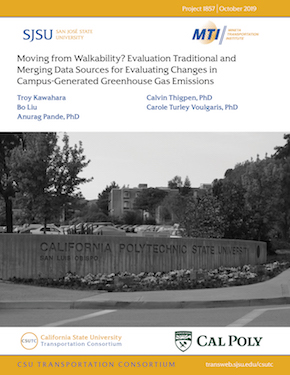- 408-924-7560
- mineta-institute@sjsu.edu
- Donate
Moving from Walkability? Evaluation Traditional and Merging Data Sources for Evaluating Changes in Campus-Generated Greenhouse Gas Emissions
Universities are increasingly committing to reduce campus-generated greenhouse gas emissions, whether voluntarily or in response to a legal mandate. As an initial step to keeping these commitments, universities need an accounting of baseline greenhouse gas emissions levels and means of monitoring changes in campus-generated greenhouse gas emissions over time. Commute-generated greenhouse gas emissions from travel to and from campus by students and employees are among the most difficult to quantify. This report examines some of the challenges associated with estimating campus-generated greenhouse gas emissions and evaluates ways to address those challenges. The purpose of this study is to identify changes in campus-generated travel behavior at California Polytechnic State University based on the results of three successive campus-wide travel surveys; to evaluate alternative data sources that have the potential to supplement or replace campus travel surveys as a source of data for campus-generated greenhouse gas emissions; and to evaluate alternate methods to estimating greenhouse gas emissions from campus-generated vehicle miles traveled, depending on the presence of campus-specific information about vehicle fleet characteristics. The results of successive travel surveys suggest that the campus population has become more car-dependent over time. Comparison of survey results with data collected from automating traffic counting devices and mobile device data suggest that surveys that are limited to members of the campus community are likely to undercount campus-generated vehicle miles traveled by excluding infrequent, but potentially long, trips by campus visitors. Finally, we find that using campus-specific information on the model years of vehicles used to commute to campus yields higher estimates of campus-generated greenhouse gas emissions, relative to average regional emissions rates.
TROY KAWAHARA
Troy Kawahara is a master’s candidate in Civil Engineering at California Polytechnic State University. He holds a bachelor’s degree in Civil Engineering from California Polytechnic State University.
BO LIU
Bo Liu is currently pursuing a PhD in urban planning at UCLA, with a focus on energy systems analysis and low-carbon growth planning. Prior to coming to UCLA, Bo worked at the Pacific Northwest National Laboratory and the New York State Assembly. He holds an M.S. in environmental science from SUNY College of Environmental Science and Forestry, an MPA from Syracuse University, and a B.S. in environmental science from Beijing Normal University.
ANURAG PANDE
Anurag Pande is an Associate Professor of Civil Engineering at California Polytechnic State University. Dr. Pande received his B. Tech. in Civil Engineering from Indian Institute of Technology Bombay in Mumbai (India), and MS and PhD in Civil Engineering from University of Central Florida (UCF). At Cal Poly he also serves as the faculty liaison for community engagement to foster partnerships between Cal Poly and nearby communities and non-profit organizations.
CALVIN THIGPEN
Calvin Thigpen recently joined Lime as a policy research manager. Prior to that, he was a post-doctoral researcher at Arizona State University. Calvin holds a PhD in Transportation Technology and Policy from UC Davis, where he administered the 2014–15 UC Davis Campus Travel Survey (CTS), an annual survey of faculty, staff, and students.
CAROLE TURLEY VOULGARIS
Carole Turley Voulgaris is an Assistant Professor of Civil Engineering at California Polytechnic State University. She holds a PhD in Urban Planning from UCLA, an MBA from the University of Notre Dame, and bachelor’s and master’s degrees in civil engineering from Brigham Young University.
-
Contact Us
San José State University One Washington Square, San Jose, CA 95192 Phone: 408-924-7560 Email: mineta-institute@sjsu.edu






